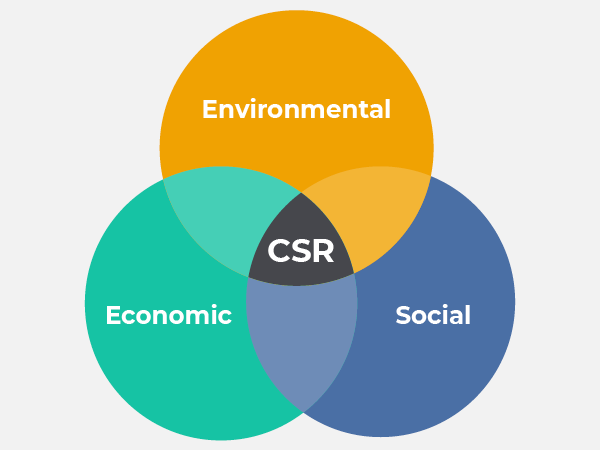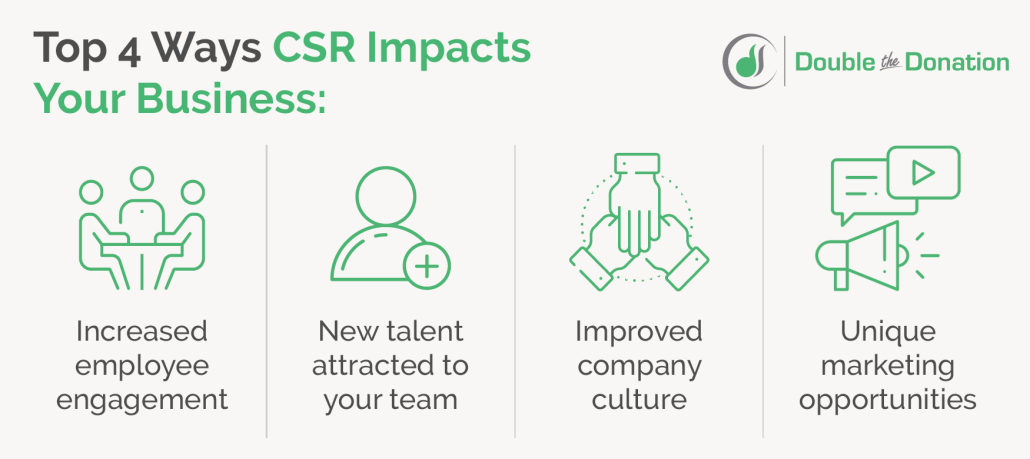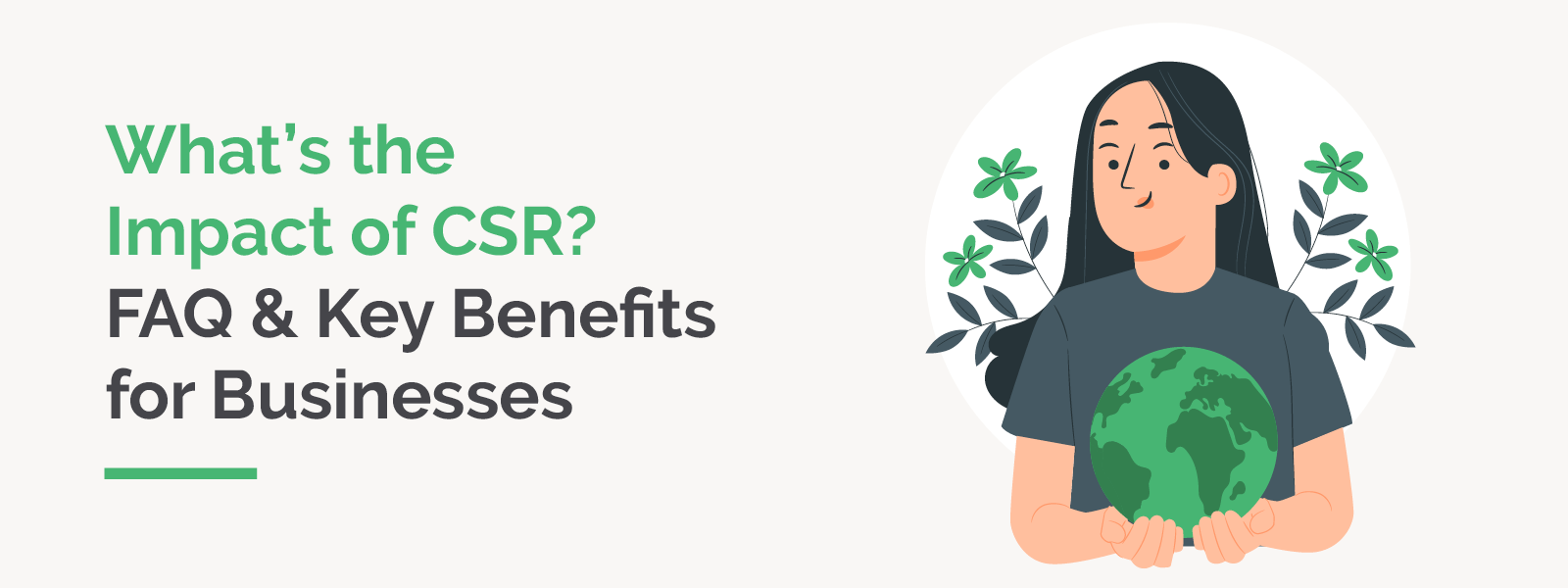What’s the Impact of CSR? FAQ & Key Benefits for Businesses
Corporate social responsibility (often referred to as CSR) is a practice followed by many companies where they work to improve society in some form as a part of corporate citizenship. CSR is often seen in terms of philanthropy, environmental leadership, ethical labor practices, and economic responsibility.
If you’re wondering what the impact of CSR is—particularly for the businesses that enact these practices in the first place—the advantages are expansive.
In this guide, we’ll dive into the benefits of corporate social responsibility and everything your company needs to know to maximize its effectiveness. We’ll explore the following topics:
- FAQs about the Impact of CSR
- Top 4 CSR Benefits for Businesses
- Key Statistics That Demonstrate the Impact of CSR
- 5 Examples of Businesses Doing CSR Right
Ready to get up to speed on socially responsible efforts and see what you can do to take your business to the next level? Let’s begin!
FAQs about the Impact of CSR
Does your company have an existing CSR plan in place that you’d like to improve, or are you looking to dive into strategic corporate social responsibility for the first time? Either way, you’ll likely have some questions regarding the practice and its effectiveness. Let’s walk through five common questions and their answers.
What are the types of corporate social responsibility?
Corporate social responsibility is an overarching term used to describe a wide range of corporate efforts that are designed to make the world a better place. Most CSR initiatives will encompass these key values:

- Environmental: Historically, corporations have been responsible for the vast majority of global emissions and other causes of climate change. Now, many businesses are working to reverse the damage through environmentally friendly initiatives in the way they manage their operations.
- Social: The “social” component of corporate social responsibility refers to a company’s impact on its community and the individuals within. Businesses following this practice should work to bring a positive net impact to people as a whole.
- Economic: CSR also incorporates responsible economic business practices where companies give generously to their communities through nonprofit donations, fair wages, and more. The idea behind economic responsibility is that companies should bring economic benefit to all stakeholders—including employees, customers, suppliers, and overall communities.
Some CSR efforts may incorporate elements from multiple categories. For example, a company financially contributing to an environmentally-focused nonprofit (whether through grants, matching gifts, etc.) can fall under both environmental and economic responsibilities. Matching gift programs often fall under multiple categories, boosting the impact of CSR on your business in each of these key areas.
How does a company become more socially responsible?
There are tons of practices that businesses of all shapes, sizes, and sectors can adopt to increase their level of corporate social responsibility. Here are a few things a company might do:
- Offer competitive wages and benefits packages to employees.
- Provide generous parental leave, tuition reimbursement, and retirement benefits.
- Participate in workplace giving programs such as matching gifts and volunteer grants.
- Support philanthropic causes in the form of monetary and in-kind donations.
- Use recycled materials while producing goods that are also recyclable.
- Reduce carbon emissions from business operations.
- Keep up with and pay corporate taxes dutifully.
The tactics you choose to employ at your business can also play a role in the benefits you see overall. For example, prioritizing staff wages and employee benefits can have a significant effect on the company’s internal culture and team member engagement. While this will likely also result in improved consumer relations (i.e., shoppers like to buy from businesses they know treat employees well), the impact seen might be lesser as compared to the effect on the employees.
And the same is true the other way around! Producing ethical goods with sustainable practices can bring positive results to both consumers and employees, though consumer relations may see a larger, more tangible impact in terms of sales.
What is ESG and how does it compare to CSR?
ESG stands for environmental, social, and governance, and it’s a measure of the extent to which a business makes a positive impact on society beyond its own shareholders.
While ESG goes hand in hand with CSR, they’re not entirely synonymous. CSR is a business model used to hold a company accountable for its actions to society, while ESG is a quantifiable measurement of a company’s social impact outcome.
How do employees participate in CSR?
Positive employee relations are a major benefit for companies that prioritize CSR. But did you know that the employees themselves can participate (and benefit) as well? Employee-driven programs can even drive positive results for your workplace!
For example, employees who participate in a company’s matching gifts or volunteer grant programs benefit from knowing their own nonprofit donations or volunteer hours are making even more significant impacts on charitable causes that they care about. Plus, they know their employers are making an effort to support their favorite charities as well. Consequently, employees can feel more satisfied in their jobs.
Try the following ideas to drive participation in CSR at your company:
- Promote new and existing CSR initiatives to employees, including specific instructions on how to get involved.
- Highlight your company’s social impact efforts during conversations with candidates and new hires.
- Gamify CSR with interactive elements such as badges, rewards, trophies, and more for top participants.
- Encourage friendly competition among employees to see which teams or individuals are the most CSR-involved.
- Set company-wide goals for participation, along with rewards or benefits for reaching those goals.
- Empower employees to suggest new ideas and feedback for existing efforts in order to continually refine your CSR strategy.
Consider using CSR software to encourage employees to get involved in your philanthropic efforts and track their engagement. CSR software provides a centralized platform for employees to access information and opportunities related to your initiatives. Plus, it can facilitate collaboration among employees, fostering a sense of community and purpose around your CSR activities.
What CSR trends are businesses adopting?
As new social, environmental, and economic needs arise, the CSR movement will continue to evolve. Here are a few CSR trends you can expect to see in the near future!
- Many companies are transitioning to more employee-driven CSR programs—especially when it comes to philanthropy. In fact, our research reports that 39% of companies aim to expand their workplace giving initiatives in the next two years!
- Companies are doing this by starting new matching gift programs, as well as expanding existing ones and making it easier for employees to participate by simplifying the matching gift request process. For example, this video explains how companies can use CSR platforms that integrate with Double the Donation’s 360MatchPro to fully automate the submission process:
Additionally, more and more companies are taking a stand on social issues and other current events. A 2020 study reported that nearly 60% of consumers expect the brands they support to have a position on topics such as racial discrimination, social justice, climate change, income inequality, and more. About 50% of survey respondents even reported conducting online research to see how a business reacts to social issues before making a buying decision!
4 Top Benefits of CSR for Businesses
Corporate social responsibility tactics provide participating companies with powerful business benefits. Consumers, employees, and other essential shareholders will be more inclined to support your efforts, and you’ll see impactful results such as these!

1. Increased employee engagement
People want to work for companies that they feel good about contributing to. When an individual knows that their efforts at a business help drive social good, they’ll be motivated to produce elevated results in their roles. And for that reason, there’s a significant positive correlation between employee engagement and corporate giving.
Pride in the company, along with belief in senior leadership, are some of the most essential drivers of employee engagement levels—and luckily, both components see benefits from social responsibility as well.
When employees are particularly engaged, the company will also see high levels of productivity, increased retention rates, and more.
2. New talent attracted to your team
Just like effective CSR efforts drive existing employees to want to do more in their roles at your company, the same efforts can also be used to attract new employees to the team.
As a result, many HR representatives are prioritizing corporate social responsibility in their recruiting efforts and within conversations with prospective candidates. Individuals looking to join a company that participates in CSR will be drawn to your business, and you’ll have a competitive advantage against other potential employers.
3. Improved company culture
Companies often see positive impacts of CSR on their internal company cultures, which, of course, helps drive increased levels of engagement and retention. For example, the following types of CSR initiatives can bring about a more positive business culture:
- Matching gifts. By matching your employees’ donations to the causes they care about most, you’ll show them that you support their personal charitable interests and want to help them make a difference.
- Group volunteer opportunities. Volunteer outings work well as team-building activities that boost morale and get staff members better acquainted with one another. Employees get to spend time with their colleagues in an informal setting while making a positive impact on their community.
- Annual giving campaigns. Encourage employees to come together once a year to give to a good cause. You can even turn it into a competition between departments and give out a prize. This sense of friendly competition brings team members closer together.
Utilizing philanthropic initiatives as a way to build a positive company culture is a common practice for many businesses. But remember, the most successful efforts involve hands-on involvement by leadership as well. When employees see their managers and company leaders participating, they’ll be more inclined to do so themselves!
4. Unique marketing opportunities
Cause marketing (or cause-related marketing) is a form of CSR in which a business supports a charitable cause while receiving strategic marketing benefits from the relationship. These types of CSR campaigns often involve a company offering to give a certain amount of money to a nonprofit in response to increased sales results (for example, 10% of a company’s profits may be donated to charity, or a business may donate $1,000 for every 100 products sold).
When done well, cause marketing enables consumers to feel good about their purchases from socially responsible companies. As a result, the consumers are willing to pay a higher price, switch brand loyalties, or increase quantities of their purchases due to it benefiting a good cause.
For your business, not only will you have the opportunity to participate in charitable efforts, but you can also gain more customers and more dollars toward your bottom line.
Key Statistics That Demonstrate the Impact of CSR
The facts about the impact of CSR speak for themselves. Take a look at these facts and figures that demonstrate the effects of CSR on employees and consumers alike:

How CSR Impacts Businesses’ Employees
(Sources: 360MatchPro and re: Charity)
71% of employees state that it’s very important to work at a company that partakes in philanthropy.
77% of employees reported a sense of purpose as part of the reason they selected their current employer.
55% of employees would take a pay cut to work for a socially responsible company.
Employees who participate in corporate giving have 75% longer tenures with their companies.
96% of employees who volunteer with their companies report having a positive company culture.
96% of employees want their employers to match the donations they make to nonprofits.
In one survey, 84% of respondents said they’re more likely to donate if their employer offers a match.
How CSR Impacts Businesses’ Consumers
(Sources: Harvard Business School)
72% of consumers believe companies should have a legal responsibility to society.
77% of consumers are motivated to purchase from companies committed to making the world a better place.
Over 90% of consumers worldwide are likely to switch to brands supporting a good cause.
More than 66% of consumers would pay more to buy from socially and environmentally responsible businesses.
Creating value for the customer, positively impacting society, and inspiring innovation and positive change are the three highest-ranking components of a company’s purpose.
88% of people want to know about a company’s CSR efforts when considering making a purchase.
5 Examples of Businesses Doing CSR Right
Looking to get started with CSR efforts but not sure how to begin? Get inspired by these popular companies that have exemplified what it looks like to be socially responsible and philanthropic.

Gilead Sciences
When it comes to philanthropic corporations, Gilead Sciences has led the pack for several years in a row. This biotechnology company contributes an average of $400 million each year to nonprofit causes, which comes out to nearly 3% of their pre-tax profits. Plus, they offer a matching gift program for current full-time employees, agreeing to match donations of up to $2,000 per year to most nonprofit organizations!
They’ve also published a number of lofty goals to further elevate their CSR by 2030—including achieving net zero operational greenhouse gas emissions, ensuring 100% of their packaging is recyclable, eliminating all unnecessary plastics, and significantly increasing Black, Hispanic, and female representation in the company.

Johnson & Johnson
Johnson & Johnson has prioritized reducing their company’s impact on the planet over the last three decades by highlighting the importance of sustainable business practices. One key pillar of this effort was accomplished by harnessing wind power to significantly reduce pollution from their operations and ultimately offering up a renewable (and economically friendly) alternative to traditional electricity.
In addition to the company’s environmental efforts, Johnson & Johnson also donates generously to many nonprofit organizations, including schools, health and human services, civic and community organizations, and more. Much of this funding is contributed through workplace giving programs as well, matching team member donations at a 2:1 rate up to $20,000 per employee per year!

Google is another example of a highly regarded business with multiple effective CSR efforts in place. As a result, the company has earned the Reputation Institute’s highest CSR score, due in part to its philanthropic initiatives, renewable energy projects, and environmental impact reduction.
Not only do their data centers use 50% less energy than other comparable institutions, but they’ve also committed more than $1 billion to develop environmental efforts in the future. Plus, they have a generous donation-matching program, offering up to a $10,000 gift match for full- and part-time employees. They even offer additional nonprofit grants through the Google Ad Grants program, which gives eligible organizations $10,000 in free monthly ad credits per month to promote their work.

Lyft
One example of a business hosting a successful cause marketing campaign as a component of an overall CSR strategy is Lyft. Through their partnership with organizations like Bread of Life, United Way, and the National Council on Aging, Lyft offered free rides to essential workers and vulnerable populations through an initiative called LyftUp during the COVID-19 pandemic.
With this model in place, Lyft has elevated its brand reputation as one that cares about the underserved in its communities, thus driving popularity and sales.

Ben & Jerry’s
Since 1988, Ben & Jerry’s has been known for being a particularly outspoken advocate for all sorts of social causes. The company has partnered with nonprofit organizations such as 1% for Peace, Farm Aid, Children’s Defense Fund, Rock the Vote, Alaska Wilderness League, MyClimate, NativeEnergy, and many more to provide aid for social, environmental, economic, and scientific causes.
They’ve also launched more than one ice cream flavor dedicated to their favorite social causes, which include “Save Our Swirled,” “Empower Mint,” “Justice ReMix’d,” and “Peace Pop.”
Final Note on the Impact of CSR
Corporate social responsibility is often framed as a win-win-win situation because companies, nonprofits, and the greater community all benefit greatly from its existence. As you consider how CSR impacts businesses like yours, think about all the good you can do for your employees, your business, and your community!
Want to learn more about the impact of CSR and philanthropy on businesses like yours? Check out these other guides:
- Why Workplace Giving Matters for Nonprofits + Companies. Workplace giving brings the advantages of CSR to the next level by prioritizing employee participation in philanthropy. Not to mention, nonprofits benefit from increased funding as well!
- Corporate Giving and Matching Gift Statistics. These powerful facts and figures about corporate philanthropy, matching gifts, and other giving programs will inspire your team to make an even more significant impact.
- Corporate Philanthropy: The Ultimate Guide to Giving. Interested in diving deeper into corporate philanthropy for your company? This complete guide to corporate giving shares key details about types of programs, business impact, and more.





